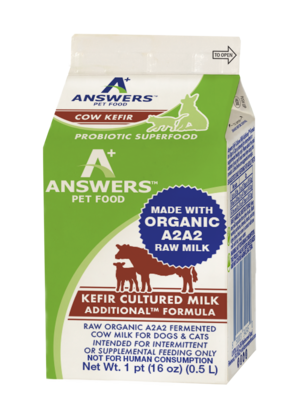Answers Pet Food Additional Kefir Cultured Milk Formula Review
PawDiet has been helping pet owners since 2015. To fund our efforts, articles may include affiliate links; if you buy something through a link, we may earn a commission.
Review of Answers Pet Food Additional Kefir Cultured Milk Formula
According to our most recent data, this product is intended for intermittent or supplemental feeding only.
Review of Ingredients
In our review of Answers Pet Food Additional Kefir Cultured Milk Formula, we'll examine all 5 ingredients and highlight the nutritional contribution of each ingredient.
While the first few ingredients typically dominate the recipe's composition, ingredients in small quantities can still have a meaningful impact on the overall nutritional profile of the recipe.
Raw cow milk can provide essential calcium for strong bones and teeth. It's also a source of vitamins and minerals that can contribute to overall health. However, some dogs may have lactose intolerance, so it's important to introduce this ingredient gradually.
The dried lactobacillus bulgaricus fermentation product is a probiotic ingredient that can help to support your dog's digestive health.
Dried lactobacillus acidophilus fermentation product is a probiotic that can aid in maintaining a healthy balance of bacteria in your dog's gut, supporting overall digestive health.
Dried Leuconostoc mesenteroides fermentation product is a beneficial probiotic that supports healthy digestion and immune function. It helps maintain a balanced gut flora, improving nutrient absorption and overall gut health for your dog.
Dried lactobacillus lactis fermentation product is a probiotic that can support your dog's gastrointestinal health by promoting a healthy balance of gut bacteria.
Review of Guaranteed Analysis
The Crude Protein content of 2.80% in the Answers Pet Food Additional Kefir Cultured Milk Formula is relatively low, which is typical for a dairy-based product like kefir. The primary source of this protein is the organic raw milk, which naturally contains proteins such as casein and whey. The live cultures listed, although they are proteinaceous in nature, are present in smaller amounts and are not the main contributors to the overall protein content.
The Crude Fat minimum of 5.00% is also derived mainly from the organic raw milk. Milk fat is a natural component of raw milk and is responsible for the richness and energy content of the kefir. Since fat is a calorie-dense nutrient, it contributes significantly to the caloric value of the food. The live cultures do not significantly contribute to the fat content.
Crude Fiber is listed at a maximum of 0.50%, which is very low. This is expected since milk and the fermentation products do not contain fiber. The fermentation process may even reduce the minuscule amount of fiber originally present in the milk, resulting in a low fiber content in the final product.
The calorie content of 640.00 per kg can be attributed to the combined macronutrients in the food, with the fat content being the most calorie-dense followed by the proteins. Carbohydrates, which are not directly listed in the guaranteed analysis, would also contribute to the caloric content, but given that the product is primarily milk and fermentation products, the carbohydrate content is likely low, especially since lactose (milk sugar) is reduced during fermentation.

